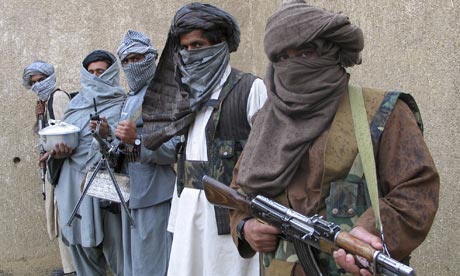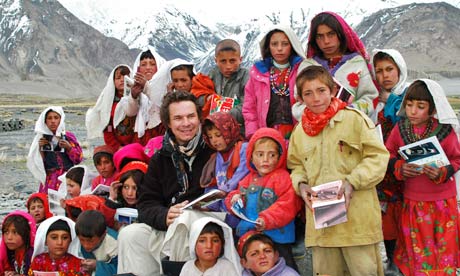America's role in the world should not be to prescribe some specific world order or police the planet by force of arms. It's to save itself.

The world -- we are incessantly told -- is becoming ever smaller, more complex, and more dangerous. Therefore, it becomes necessary for the nation to intensify the efforts undertaken to “keep America safe,” while also, of course, advancing the cause of world peace. Achieving these aims -- it is said -- requires the United States to funnel ever greater sums of money to the Pentagon to develop new means of projecting power, and to hold itself in readiness for new expeditions deemed essential to pacify (or liberate) some dark and troubled quarter of the globe.
At one level, we can with little difficulty calculate the cost of these efforts: The untold billions of dollars added annually to the national debt and the mounting toll of dead and wounded U.S. troops provide one gauge.
At a deeper level, the costs of adhering to the Washington consensus defy measurement: families shattered by loss; veterans bearing the physical or psychological scars of combat; the perpetuation of ponderous bureaucracies subsisting in a climate of secrecy, dissembling, and outright deception; the distortion of national priorities as the military-industrial complex siphons off scarce resources; environmental devastation produced as a by-product of war and the preparation for war; the evisceration of civic culture that results when a small praetorian guard shoulders the burden of waging perpetual war, while the great majority of citizens purport to revere its members, even as they ignore or profit from their service.
No doubt the case can, and probably will, be made that the obligations of global leadership demand that the United States take on the problems besetting Pakistan, Yemen, and Somalia, much as it has addressed those besetting Afghanistan and Iraq.
Little evidence exists to suggest that such efforts are likely to have a positive effect, however. No evidence exists -- none -- to suggest that U.S. efforts will advance the cause of global peace. If, as many suspect, Washington’s actual aim is something more akin to dominance or hegemony, then evidence exists in abundance demonstrating that the project is a self-defeating one.
Critics of U.S. foreign policy questioned the wisdom and feasibility of forcibly attempting to remake the world in America’s image. They believed that even to make the attempt was to court corruption in the form of imperialism and militarism, thereby compromising republican institutions at home. Representing no one party but instead a great diversity of perspectives, they insisted that, if America has a mission, that mission is to model freedom rather than to impose it.
The famed diplomat-turned-historian George Kennan, a cultural conservative, was one such critic. Senator J. William Fulbright, a died-in-wool liberal internationalist, was another. The influential social critic Christopher Lasch, a self-professed radical, was a third. Martin Luther King, arguably the dominant moral figure of the American Century, was a fourth.
Writing to an acquaintance in the midst of the Korean War, Kennan argued that Americans had for too long subjected their garden to abuse. “It seems to me,” he wrote, “that our country bristles with imperfections -- and some of them very serious ones -- of which we are almost universally aware, but lack the resolution and civic vigor to correct.” Here lay the real danger. “What is at stake here is our duty to ourselves and our own national ideals.” In a contemporaneous lecture, Kennan returned to this theme. To observers abroad, he suggested,
the sight of an America in which there is visible no higher social goal than the self-enrichment of the individual, and where that self-enrichment takes place primarily in material goods and gadgets that are of doubtful utility in the achievement of the deeper satisfactions of life -- this sight fails to inspire either confidence or enthusiasm.
Rather than obsessing about the threat posed by the Soviet Union, the nation needed to set its own house in order. By demonstrating a capacity to nurture “a genuinely healthy relationship both of man to nature and of man to himself,” Kennan believed, Americans might “then, for the first time, have something to say to people elsewhere,” perhaps even becoming “a source of inspiration” to others.
A decade after Kennan, in the midst of another dubious war, Senator Fulbright assessed the implications of believing that America’s own well-being required constant meddling abroad. It was, he wrote, “neither the duty nor the right of the United States to sort out” all of the world’s WASHINGTON RULES problems. “[M]any things happen in many places,” wrote the chairman of the Senate Foreign Relations Committee, “that are either none of our business or in any case are beyond the range of our power, resources, and wisdom.” It was long past time for the United States to “confine herself to doing only that good in the world which she can do, both by direct effort and by the force of her example,” abandoning her “missionary idea full of pretensions about being the world’s policeman.”
Lasch, who spent decades ruthlessly dissecting American culture, concurred. “The real promise of American life,” he insisted, was to be found in “the hope that a self-governing republic can serve as a source of moral and political inspiration to the rest of the world, not as the center of a new world empire."
Martin Luther King went even further. In the spring of 1967, preaching on the raging Vietnam War, he insisted that the time had come “for all people of conscience to call upon America to come back home.” Before attempting to save others, the nation needed to acknowledge and correct its own sins and failings.
To none of these men did coming home imply passivity or so-called isolationism. It did, however, mean revising the hierarchy of national priorities. In that regard, the militarization of U.S. policy, exemplified above all by the Vietnam War, had diverted the nation’s attention from pursuing its true calling. The arduous work of creating a free society remained far from finished. Only by turning away from war would the United States be able to tackle what King referred to as the “giant triplets of racism, extreme materialism, and militarism.”
he essential credo to which each of these figures subscribed, a variant of the convictions first articulated by the Cultivating Our Own Garden Founders, deserves renewed consideration today. Its essence is simply this: America’s purpose is to be America, striving to fulfill the aspirations expressed in the Declaration of Independence and the Constitution as reinterpreted with the passage of time and in light of hard-earned experience.
The proper aim of American statecraft, therefore, is not to redeem humankind or to prescribe some specific world order, nor to police the planet by force of arms. Its purpose is to permit Americans to avail themselves of the right of self-determination as they seek to create at home a “more perfect union.” Any policy impeding that enterprise -- as open-ended war surely does -- is misguided and pernicious.
By demonstrating the feasibility of creating a way of life based on humane, liberal values, the United States might help illuminate the path ahead for others who seek freedom. Or as Randolph Bourne once put it, “a turning within” is essential “in order that we may have something to give without.” Yet this “giving without” qualifies as an extra benefit -- a bonus or dividend -- not as the central purpose of American life.
In short, if the United States has a saving mission, it is, first and foremost, to save itself. In that regard, Dr. King’s list of evils may need a bit of tweaking. In our own day, the sins requiring expiation number more than three. Yet in his insistence that we first heal ourselves -- “Come home, America!” -- King remains today the prophet Americans would do well to heed.
A New Trinity
Here, too, there exists an alternative tradition to which Americans today could repair, should they choose to do so. This tradition harks back to the nearly forgotten anti-imperial origins of the Republic. Succinctly captured in the motto “Don’t Tread on Me,” this tradition is one that does not seek trouble but insists that others will accord the United States respect. Updated for our own time, it might translate into the following substitute for the existing sacred trinity.
First, the purpose of the U.S. military is not to combat evil or remake the world, but to defend the United States and its most vital interests. However necessary, military power itself is neither good nor inherently desirable. Any nation defining itself in terms of military might is well down the road to perdition, as earlier generations of Americans instinctively understood. As for military supremacy, the lessons of the past are quite clear. It is an illusion and its pursuit an invitation to mischief, if not disaster. Therefore, the United States should maintain only those forces required to accomplish the defense establishment’s core mission.
Second, the primary duty station of the American soldier is in America. Just as the U.S. military should not be a global police force, so too it should not be a global occupation force. Specific circumstances may from time to time require the United States on a temporary basis to establish a military presence abroad. Yet rather than defining the norm, Americans should view this prospect as a sharp departure, entailing public debate and prior congressional authorization. Dismantling the Pentagon’s sprawling network of existing bases promises to be a lengthy process. Priority should be given to those regions where the American presence costs the most while accomplishing the least. According to those criteria, U.S. troops should withdraw from the Persian Gulf and Central Asia forthwith.
Third, consistent with the Just War tradition, the United States should employ force only as a last resort and only in self-defense. The Bush Doctrine of preventive war -- the United States bestowing on itself the exclusive prerogative of employing force against ostensible threats even before they materialize—is a moral and strategic abomination, the very inverse of prudent and enlightened statecraft. Concocted by George W. Bush to justify his needless and misguided 2003 invasion of Iraq, this doctrine still awaits explicit abrogation by authorities in Washington. Never again should the United States undertake “a war of choice” informed by fantasies that violence provides a shortcut to resolving history’s complexities.
Were this alternative triad to become the basis for policy, dramatic changes in the U.S. national security posture would ensue. Military spending would decrease appreciably. The Pentagon’s global footprint would shrink. Weapons manufacturers would see their profits plummet. Beltway Bandits would close up shop. The ranks of defense- oriented think tanks would thin. These changes, in turn, would narrow the range of options available for employing force, obliging policy makers to exhibit greater restraint in intervening abroad. With resources currently devoted to rehabilitating Baghdad or Kabul freed up, the cause of rehabilitating Cleveland and Detroit might finally attract a following.
Choosing
President Lyndon Johnson had hoped that an ambitious domestic reform program known as the Great Society might define his legacy. Instead, he bequeathed to his successor a nation that was bitterly divided, deeply troubled, and increasingly cynical.
To follow a different course would have required Johnson to depart from the Washington rules. This he -- although not he alone -- lacked the courage to do.
Here lies the real significance -- and perhaps the tragedy -- of Barack Obama’s decision, during the first year of his presidency, to escalate the U.S. military effort in Afghanistan. By retaining Robert Gates as defense secretary and by appointing retired four-star officers as his national security adviser and intelligence director, Obama had already offered Washington assurances that he was not contemplating a radical departure from the existing pattern of national security policy. Whether wittingly or not, the president now proffered his full-fledged allegiance to the Washington consensus, removing any lingering doubts about its durability.
In his speech of December 1, 2009, while explaining to the cadets at West Point why he felt it necessary to widen a war already in its ninth year, Obama justified his decision by appending it to a much larger narrative. “More than any other nation,” he declared, “the United States of America has underwritten global security for over six decades -- a time that, for all its problems, has seen walls come down, and markets open, and billions lifted from poverty, unparalleled scientific progress and advancing frontiers of human liberty.” Obama wanted it known that by sending tens of thousands of additional U.S. troops to fight in Afghanistan his own administration was carrying on the work his predecessors had begun. Their policies were his policies.
The six decades to which the president referred in his artfully sanitized rendering of contemporary history were the years during which the American credo and the sacred trinity had ascended to a position of uncontested supremacy. Thus did the president who came into office vowing to change the way Washington works make known his intention to leave this crucially important element of his inheritance all but untouched. Like Johnson, the president whose bold agenda for domestic reform presaged his own, Obama too was choosing to conform.
Still, we should be grateful to him for making at least one thing unmistakably clear: To imagine that Washington will ever tolerate second thoughts about the Washington rules is to engage in willful self- deception. Washington itself has too much to lose.
If change is to come, it must come from the people. Yet unless Americans finally awaken to the fact that they've been had, Washington will continue to have its way.
So the need for education -- summoning Americans to take on the responsibilities of an active and engaged citizenship -- has become especially acute. For me personally, education became possible twenty years ago at the Brandenburg Gate when I contemplated the disparity between what I had been conditioned to believe and what I was actually witnessing. The dissonance was too great to ignore. The ensuing process of confronting illusions (including my own) and of dissecting the contradictions besetting U.S. policy was sometimes painful and never easy. Yet it included moments of considerable exhilaration and its overall effect has been liberating. Self-awareness is a great gift. The ability to see things as they are, without blinders, is an even greater one.
Americans today must reckon with a contradiction of gaping proportions. Promising prosperity and peace, the Washington rules are propelling the United States toward insolvency and perpetual war. Over the horizon a shipwreck of epic proportions awaits. To acknowledge the danger we face is to make learning -- and perhaps even a course change -- possible. To willfully ignore the danger is to become complicit in the destruction of what most Americans profess to hold dear. We, too, must choose.



 Any negotiations with the
Any negotiations with the


 People dressed as Moors perform on a boat off the coast of Villajoyosa during the Moors and Christians festivities. Photograph: Jose Jordan/AFP/Getty Images
People dressed as Moors perform on a boat off the coast of Villajoyosa during the Moors and Christians festivities. Photograph: Jose Jordan/AFP/Getty Images




